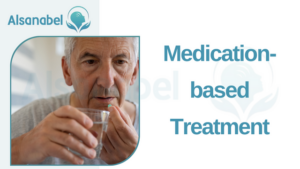Different Treatment Options for Depression 2024
- Category ADHD
Depression and its Treatment Options
Depression is caused by a combination of genetic, environmental, and psychological factors. It can affect anyone, regardless of age, gender, or background. Some people may experience mild or moderate, while others may have severe depression that significantly affects their daily life.
The most common treatment options include:
- Medications: Antidepressant medications are one of the most commonly prescribed treatments for depression.
- Psychotherapy: Also known as talk therapy, is a popular treatment option for depression. It involves meeting with a mental health professional to discuss thoughts, emotions, and behaviors related to depression.
- Electroconvulsive Therapy (ECT): Treatment option for severe depression that has not responded to other treatments. It involves passing an electric current through the brain to induce a seizure.
- Transcranial Magnetic Stimulation (TMS): Newer type of treatment for depression. It involves using a magnetic field to stimulate nerve cells in the brain.
Medication-based Treatment
Antidepressant medications are a common treatment option for depression. They work by balancing chemicals in the brain that affect mood. Antidepressants fall into three categories: selective serotonin reuptake inhibitors (SSRIs), serotonin-norepinephrine reuptake inhibitors (SNRIs), and tricyclic antidepressants (TCAs). It is essential to work with a healthcare provider to determine the best medication and dosage for each person’s unique situation.

Antidepressant Medications
SSRIs are the most commonly prescribed type of antidepressant due to their effectiveness and minimal side effects. They work by increasing the level of serotonin in the brain, which improves mood. SNRIs also increase the level of serotonin but also norepinephrine, a chemical that affects motivation and energy levels. TCAs are an older type of antidepressant that can be effective but also have more side effects than newer medications.
Side Effects of Antidepressant Medications
Antidepressants can have side effects, including nausea, drowsiness, weight gain, and sexual dysfunction. It is important to communicate any side effects with a healthcare provider to adjust the medication or dosage as necessary. Some people may need to try different medications or combinations of medications to find what works best for them.
Psychotherapy-based Treatment
Psychotherapy, also known as talk therapy, is another common treatment option. It involves working with a mental health professional to identify and address the root causes of depression, as well as to develop coping skills and strategies to manage symptoms.
Cognitive Behavioral Therapy (CBT)
CBT is a type of psychotherapy that focuses on changing negative thought patterns and behaviors that contribute to depression. It involves identifying and challenging negative thoughts and replacing them with more positive and realistic ones. CBT is typically a short-term treatment, with most people seeing improvements in their symptoms within 12 to 20 sessions.
Interpersonal Therapy (IPT)
IPT is a type of psychotherapy that focuses on improving relationships and communication skills. It helps people to identify and address relationship problems, such as conflicts with family members or coworkers. IPT is typically a short-term treatment, with most people seeing improvements in their symptoms within 12 to 16 sessions.
Like medication-based treatment, psychotherapy can also have side effects, such as emotional discomfort as people address difficult issues. However, working with a qualified mental health professional can help navigate these challenges and ultimately lead to better management of symptoms and an improved quality of life.
Alternative Treatment Options
Aside from medication and psychotherapy, there are also alternative treatment options available for people. These options have gained popularity in recent years due to their potential effectiveness and fewer side effects compared to traditional forms of treatment. Here are two examples of alternative treatment options:

Exercise and Meditation
Regular exercise and meditation have been found to improve mood and reduce symptoms of depression. Exercise helps release endorphins, the body’s “feel-good” chemicals, while meditation helps calm the mind and reduce stress. Both can also lead to better sleep, which is crucial for overall mental health. It’s important to note that while exercise and meditation may not work for everyone, they can be a low-cost and low-risk option worth exploring.
Herbal Supplements
Some herbal supplements, such as St. John’s Wort and SAM-e, have been found to be effective in treating mild to moderate depression. However, it’s important to speak with a healthcare provider before taking any supplements, as they can interact with other medications and may not be appropriate for everyone. Additionally, herbal supplements are not regulated by the FDA, so it’s important to choose trusted brands and sources.
Neurostimulation-based Treatment
For people with severe depression who have not responded to traditional forms of treatment, neurostimulation-based treatment options may be recommended by healthcare providers. Here are two examples of these options:
Electroconvulsive Therapy (ECT)
ECT involves the use of electrical currents to induce a brief seizure in the brain, which can improve depressive symptoms. It is typically used for severe cases of depression, such as those with suicidal thoughts or who have not responded to other forms of treatment. ECT is performed under general anesthesia, and side effects may include temporary memory loss and headaches. However, these side effects are typically temporary and improve over time.
Transcranial Magnetic Stimulation (TMS)
TMS involves the use of magnetic fields to stimulate nerve cells in the brain that are involved in mood regulation. It is a non-invasive procedure that is typically performed in a healthcare provider’s office. TMS sessions last about 30-60 minutes, and patients can return to their normal daily activities immediately after the procedure. Some potential side effects include headaches and scalp discomfort, but these are typically mild and temporary.
While neurostimulation-based treatments may be effective for some people, they are typically reserved for those with severe depression who have not responded to other forms of treatment. It’s important to speak with a healthcare provider to determine whether these options are appropriate for each individual case. Neurostimulation-based treatments should also be performed by trained professionals in a healthcare setting.
Combination Treatment Options
For individuals with depression who have not experienced success with a single form of treatment, combining treatments may be recommended by healthcare providers. Here are two examples of these options:
Medication and Psychotherapy
Medications can be effective in treating depression by correcting chemical imbalances in the brain. Psychotherapy, also known as talk therapy, involves discussing emotions, behaviors, and thought patterns with a trained mental health professional. Combining medication with psychotherapy can be more effective than either treatment alone. Medications can help alleviate symptoms, while psychotherapy can address underlying issues and teach coping skills.
Psychotherapy and Neurostimulation
In addition to the traditional forms of psychotherapy, some people may benefit from combining psychotherapy with neurostimulation treatments. This may involve using neurostimulation in conjunction with talk therapy to treat depression. Combining the two treatments can help improve their effectiveness.
Overall, combination treatment options may be beneficial for individuals with depression who have not experienced success with a single form of treatment. However, it’s important to consult with a healthcare provider to determine the most appropriate course of action. Combining treatments should also be done under the guidance of a trained professional in a healthcare setting.
Seeking Professional Help
For individuals experiencing depression, seeking professional help is often the first step towards recovery. There are a number of different healthcare providers who can offer support and guidance throughout the treatment process.

How to Find Professional Help
One option is to contact your health insurance provider for a list of in-network mental health providers. This can help narrow down the search and ensure that the care received is covered by insurance.
Another option is to contact mental health organizations such as the National Alliance on Mental Illness (NAMI) or Mental Health America (MHA) for resources and referrals.
It’s important to research and compare different providers to find one that fits your individual needs and preferences. Factors such as location, availability, and area of expertise should be taken into consideration.
Supporting a Person with Depression
One of the most important things to do is to simply be present and available. Let the person know that you are there for them and willing to listen. Encourage them to talk about their feelings and struggles without judgment or criticism.
It’s also important to provide practical support, such as helping with household tasks or offering to accompany them to appointments. Encourage them to engage in activities they enjoy, such as hobbies or exercise, and offer to participate with them.
Encourage them to seek professional help and offer to assist in finding a suitable healthcare provider. It’s important to respect their decisions and allow them to take ownership of their treatment plan.
Helpful Resources
There are a number of resources available to offer additional support and guidance. Mental health organizations such as the National Alliance on Mental Illness (NAMI) and Mental Health America (MHA) offer resources and support for individuals and their loved ones.
Support groups can also be beneficial, providing a safe and supportive environment to share experiences and connect with others who are going through similar struggles.
It’s also important to offer practical support in addition to emotional support. Provide assistance with household tasks or offer transportation to appointments. Encourage the person with depression to engage in activities they enjoy, such as hobbies or exercise, and offer to join them to make it more fun.
Encourage them to consider professional treatment and offer to help them find a suitable healthcare provider. Remember to respect their autonomy and allow them to take charge of their healing journey.
In conclusion, depression can be challenging, but it’s possible to cope with it with the right treatment and support. By showing care, encouragement, and resources, individuals with depression can feel empowered and supported on their journey towards recovery. It’s similarly crucial to recognize that everyone has a unique healing journey, so personalized treatment embedded in adequate care and collaboration would make a significant difference.









